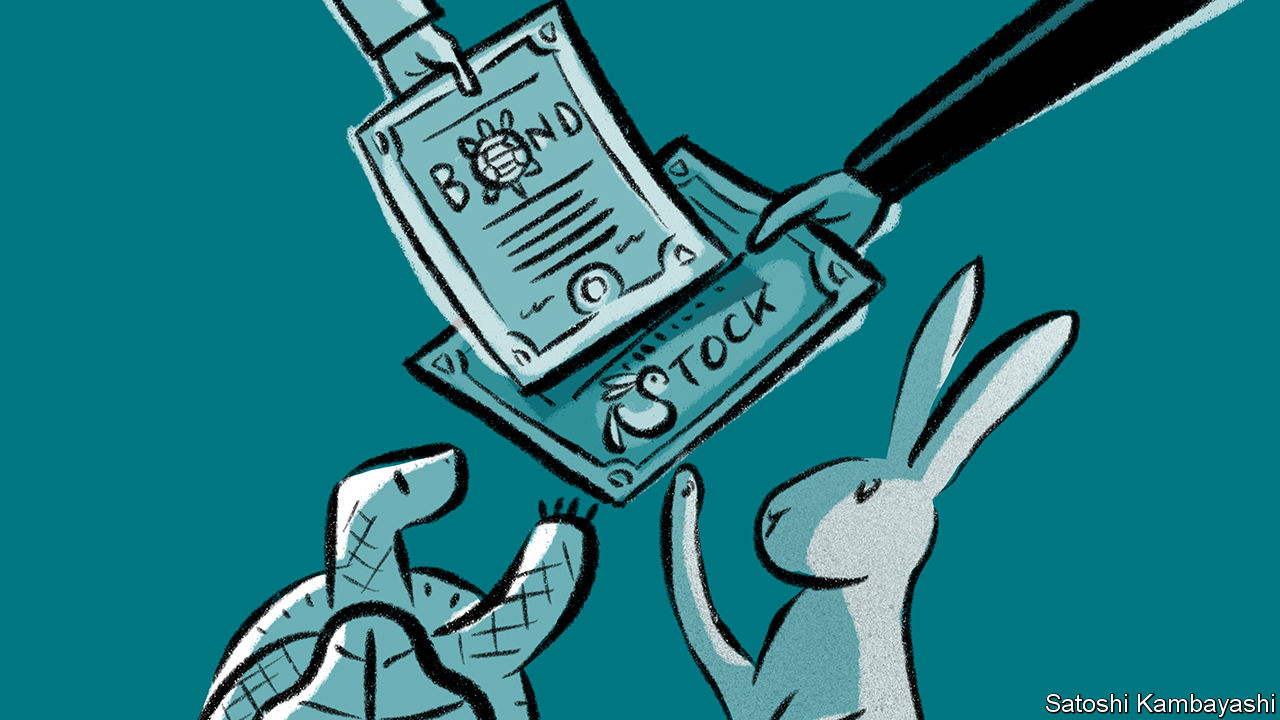Why the ideal portfolio depends on the business you are in.

IMAGINE two college friends whose careers have taken different paths. Simon is an investment banker. He works long hours, especially when his bank is advising on a big merger. His pastimes include potholing and skydiving. Chris works as a senior civil servant. Early each evening the lights in his office dim to remind his colleagues of the importance of work-life balance. His spare time is spent on long country walks, playing golf and going to the theatre.
How should they invest their money? More specifically, how much of their savings should go to bonds and how much to shares? Textbook theory says it depends on how tolerant Simon and Chris are towards risk. If either can bear the sometimes violent ups-and-downs of stockmarkets, he should hold more shares, which have higher rewards to go with the extra risk. Should such price swings keep him awake at night with worry, he should tilt the mix of his investments towards safer government bonds..
A risk-lover such as Simon is happy to own mostly shares. If you think skydiving is fun, you probably will not lose sleep if the value of your portfolio goes down from time to time. By the same logic Chris, who prefers a quiet life, is content to hold a bigger slug of bonds than Simon. Yet on a broader reckoning, both friends would be better advised to go against their inclinations. Simon, the banker, should buy mostly bonds. Chris, the bureaucrat, should buy mostly stocks.
If that seems paradoxical, consider the nature of each friend’s line of work. Simon’s professional fortunes are tied to the stockmarket. When share prices are booming, the general appetite for business risk is high. Investment projects are approved. Deals are done. The demand for the services of investment banks is strong. Simon’s bank makes pots of money and his bonus surges. His fortunes are changeable, though. When the stockmarket is down, the bank’s profits plunge. So his returns are high, but also volatile—like a stock. To hedge against the stock-like returns of his occupation, Simon should own bonds. In contrast, Chris enjoys a bond-like career. His salary is lower but steadier. His job is not at risk in downturns. So he can afford to take bigger risks with his investments. He should own stocks.
Your job is your down-payment
This is not to say that preferences about risk do not matter to investment choices. They do. It is that wealth should be looked at in the round. A proper reckoning would include not only financial assets but human capital—a person’s knowledge, skills and talents. This has a big influence on earnings over a working life. Young people, with few savings and decades of employment ahead, have most of their lifetime wealth embedded in their human capital. It has a payoff, just like a stock or a bond. It makes sense to take account of that when deciding what to hold as financial wealth.
This way of thinking comes more naturally to people who work in finance. There are fund managers with most of their professional portfolio in stocks but all of their personal wealth in three-month bills. If the bets on stocks turn bad, they might find themselves out of a job. They do not want to put all their personal savings at risk as well.
But most people do not think like this. The available evidence suggests that households do not attempt to hedge their employment income. In fact, they typically “anti-hedge”, by holding a disproportionate fraction of their savings in the shares of their employer or of companies in the same industry or locality.
A paper, published in 2003, by James Poterba of the Massachusetts Institute of Technology discovered that an average of more than 40% of the value of the 20 largest company-pension plans in America was invested in the firm’s own shares. The dangers of such a strategy had recently become apparent. When Enron failed, its employees had over 60% of their retirement savings in company stock. Another study based on Swedish data by Massimo Massa, of INSEAD, and Andrei Simonov, now of Michigan State University, also found that households tend to invest in stocks that are closely related to their employment income.
People stick to what they know for understandable reasons. Investment can seem like an aggressive sport, the preserve of bulls and bears or Wall Street wolves. Yet it would be more helpful to think of investment as self-insurance. People save and invest to protect themselves from contingencies. The best way to guard against some sorts of risks is often to embrace a different kind. The kind of insurance you will need ultimately depends on who you are.
No comments:
Post a Comment
Note: Only a member of this blog may post a comment.